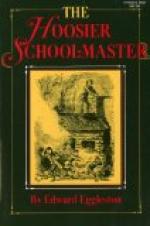[Footnote 11: This word plunder is probably from Pennsylvania, as it is exactly equivalent to the German word plunder, in the sense of household effects, the original meaning of the word in German. Any kind of baggage may be called plunder, but the most accepted sense is household goods. It is quite seriously used. I have seen bills of lading on the Western waters certifying that A.B. had shipped “1 lot of plunder;” that is, household goods. It is here used figuratively for goods in general.]
[Footnote 12: Congress land was the old designation for land owned by the government. Under the Confederation, the Congress was the government, and the forms of speech seem to have long retained the notion that what belonged to the United States was the property of Congress.]
[Footnote 13: The commonest use of the word chunk in the old days was for the ends of the sticks of cord-wood burned in the great fireplaces. As the sticks burned in two, the chunks fell down or rolled back on the wall side of the andirons. By putting the chunks together, a new fire was set a-going without fresh wood. This use of the word is illustrated in a folk-rhyme or nursery jingle of the country which has neither sense nor elegance to recommend it:
“Old Mother Hunk
She got drunk
And fell in the fire
And kicked up a chunk.”
]
CHAPTER IV.
SPELLING DOWN THE MASTER.
“I ’low,” said Mrs. Means, as she stuffed the tobacco into her cob pipe after supper on that eventful Wednesday evening: “I ’low they’ll app’int the Squire to gin out the words to-night. They mos’ always do, you see, kase he’s the peartest[14] ole man in this deestrick; and I ’low some of the young fellers would have to git up and dust ef they would keep up to him. And he uses sech remarkable smart words. He speaks so polite, too. But laws! don’t I remember when he was poarer nor Job’s turkey? Twenty year ago, when he come to these ’ere diggings, that air Squire Hawkins was a poar Yankee school-master, that said ‘pail’ instid of bucket, and that called a cow a ‘caow,’ and that couldn’t tell to save his gizzard what we meant by ’low[15] and by right smart[16]. But he’s larnt our ways now, an’ he’s jest as civilized as the rest of us. You would-n know he’d ever been a Yankee. He didn’t stay poar long. Not he. He jest married a right rich girl! He! he!” And the old woman grinned at Ralph, and then at Mirandy, and then at the rest, until Ralph shuddered. Nothing was so frightful to him as to be fawned on by this grinning ogre, whose few lonesome, blackish teeth seemed ready to devour him. “He didn’t stay poar, you bet a hoss!” and with this the coal was deposited on the pipe, and the lips began to crack like parchment as each puff of smoke escaped. “He married rich, you see,” and here another significant




